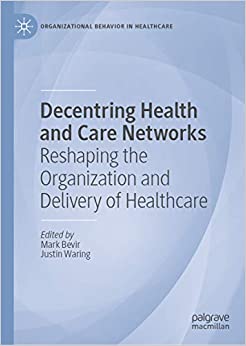Networks have become a prominent template for public service governance. Often seen as an alternative to hierarchies and contracts, networks cross institutionalized organizational or sectoral boundaries to promote collaboration and the sharing of resources when addressing complex problems. Nowhere is this more the case than in the field of health services modernization and improvement.
Comprising unique empirical contributions, drawn primarily from the experience of the UK National Health Service (NHS), this edited collection develops a ‘decentred’ analysis of health and care networks. Contributors look beyond particular structures or patterns of governance and focus instead on the interpretation of the meaningful practices of policy actors as they encounter and enact policy instruments and structures. The approach offers a distinct form of analysis that deepens and enriches more traditional public policy accounts of network governance. It recognizes the influence of local history, highlights the influence of dominant economic, technical and corporate narratives, and acknowledges the continued influence of biomedical knowledge and professional expertise.
Offering practical insight for current and future service leaders about the challenges of implementing, managing and working within networks, this book draws out key messages for practitioners and researchers alike.











